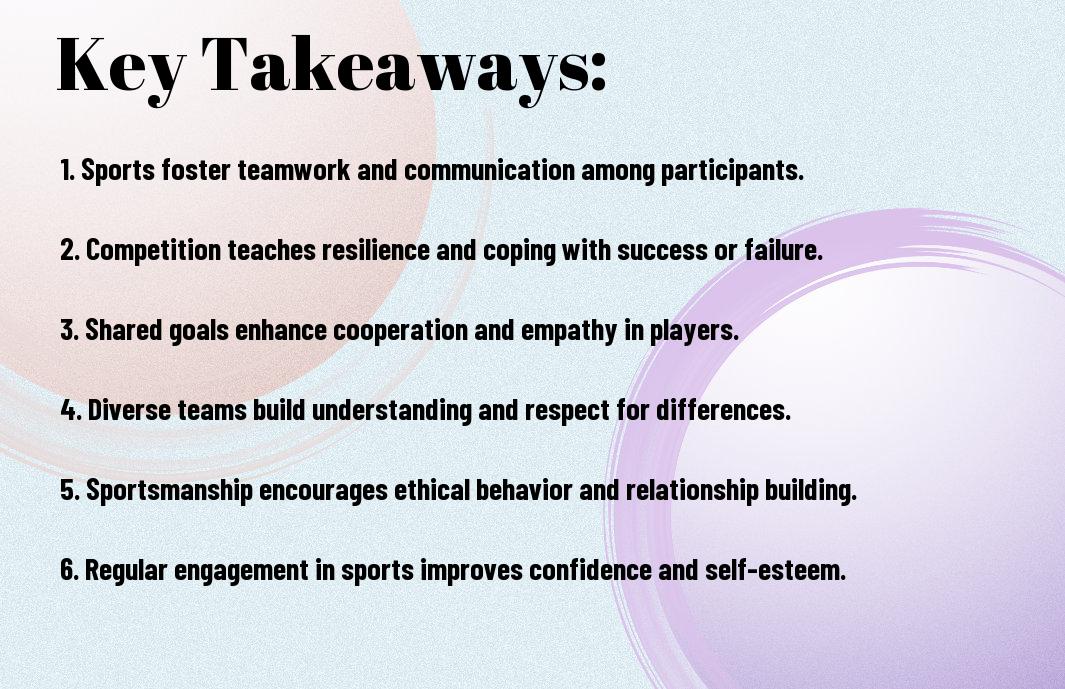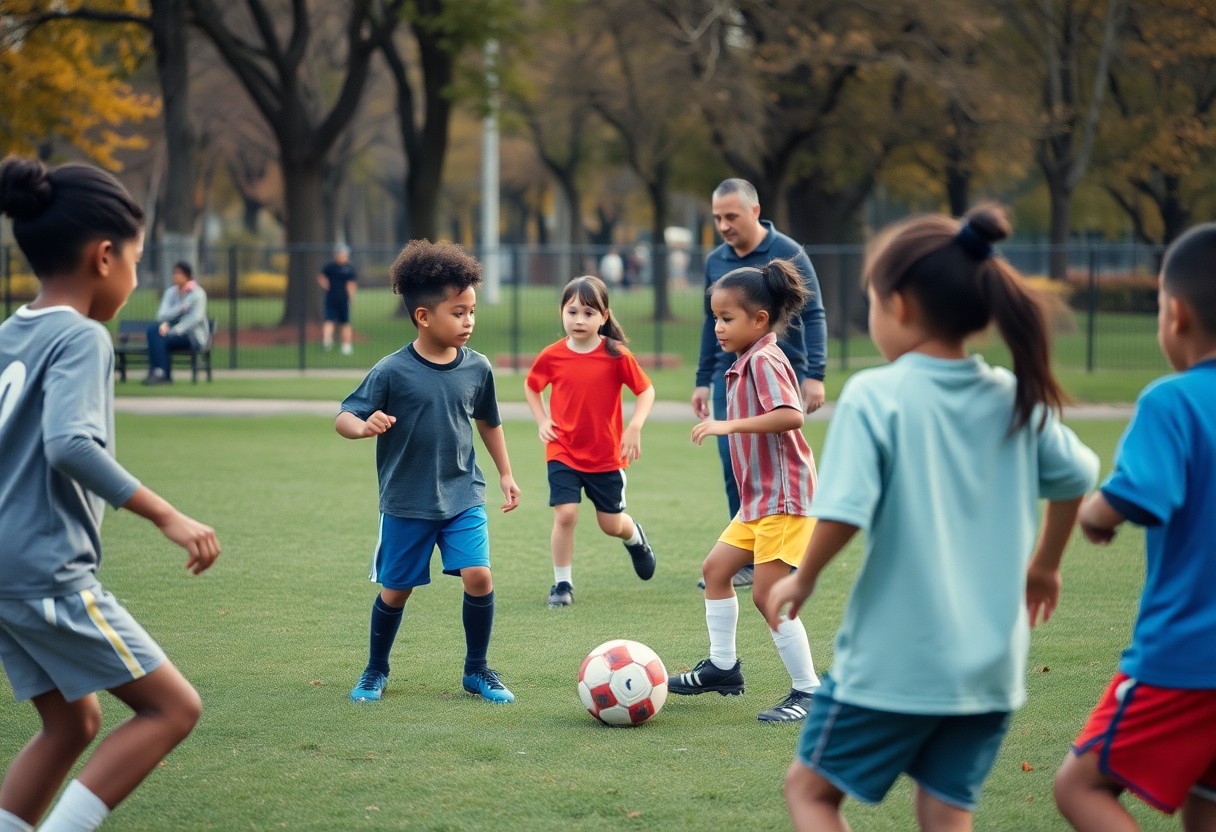Sports offer you a unique platform to enhance your social skills while engaging in physical activity. Through teamwork, communication, and competition, you not only develop athletic abilities but also navigate social dynamics that can enrich your personal and professional relationships. Understanding how sports foster these skills can lead to a greater appreciation of the role they play in your life and the lives of those around you. This blog post will explore the various ways in which participating in sports helps you cultivate necessary interpersonal skills.
Key Takeaways:
- Teamwork: Sports encourage players to collaborate and work together towards a common goal, enhancing their ability to cooperate with others.
- Communication: Engaging in sports fosters effective verbal and non-verbal communication skills as individuals learn to convey strategies and information during gameplay.
- Conflict Resolution: Participation in sports teaches individuals how to resolve disputes amicably, promoting negotiation skills and mutual understanding among teammates.
- Discipline: Through sports, individuals cultivate discipline and a sense of responsibility, which translates to better interpersonal relations in various social settings.
- Empathy: Experiencing wins and losses in a sports environment helps individuals develop empathy for teammates and opponents, enhancing their emotional intelligence.
The Importance of Social Skills in Youth Development
The development of social skills is crucial for youth as it lays the groundwork for effective communication and relationship-building. When you help young people cultivate these skills, you empower them to navigate social situations with confidence and empathy. Strong social skills enable your youth to collaborate with peers, resolve conflicts, and develop a sense of belonging in their communities. In nurturing these abilities, you significantly enhance their emotional intelligence, which plays a vital role in their overall personal and academic success.


Sports as a Platform for Social Interaction
Some might overlook the power of sports as a social conduit, but engaging in athletic activities creates opportunities for interaction in a dynamic environment. Whether through team competitions or casual pick-up games, sports allow you to connect with individuals from varied backgrounds while fostering friendships and shared experiences. This interaction not only enhances your social networks but also cultivates a sense of camaraderie and belonging that extends beyond the playing field.
Team Dynamics and Cooperation
Social interactions within a sports team require members to collaborate toward a common goal. You learn to value each player’s strengths and weaknesses, paving the way for mutual respect and teamwork. As roles shift and adapt during play, you discover the importance of flexibility, which fortifies your ability to cooperate and encourages a positive team atmosphere.
Communication Skills Development
To thrive in sports, effective communication is vital. This involves not only verbal exchanges but also non-verbal cues and gestures that signal intentions during a game. Your ability to articulate strategies, provide encouragement, and respond to teammates fosters clarity and cohesion within the team.
For instance, when you play basketball, calling out plays and making eye contact with your teammates can significantly enhance your effectiveness on the court. Good communication helps you understand each other’s movements and intentions better, which is vital in high-pressure situations. Moreover, the constant feedback from peers further sharpens your ability to listen actively, respond promptly, and engage in constructive dialogue, skills that translate well into everyday social interactions beyond sports.
Building Confidence and Self-Esteem Through Sports
If you participate in sports, you have the opportunity to build confidence and self-esteem throughout your athletic journey. Engaging in physical activities helps you push your boundaries, discover your strengths, and develop a sense of accomplishment. This process fosters a positive self-image, encouraging you to take on new challenges both in sports and in other areas of your life.
Overcoming Challenges and Setbacks
The ability to overcome challenges and setbacks in sports is a significant factor in boosting your confidence. Whether you experience a tough loss or struggle to improve your skills, these hurdles teach resilience. Each time you face a setback and manage to keep going, you build a stronger belief in your capabilities, equipping you to handle future adversities more effectively.
Recognition and Achievement
Beside overcoming obstacles, recognition and achievement play a vital role in enhancing your self-esteem in sports. Accomplishments, whether large or small, validate your hard work and dedication, instilling a sense of pride in your abilities and efforts. Such recognition, whether from teammates, coaches, or personal milestones, reinforces your belief in yourself.
And when you achieve recognition through sports, it offers you a tangible measure of your progress and dedication. Celebrating milestones, like mastering a difficult skill or winning a competition, can significantly boost your self-worth. This acknowledgment fuels your motivation to continue improving, fostering a cycle of success where your self-esteem grows with every accomplishment you achieve.
Fostering Inclusion and Diversity
Not only do sports provide a platform for competition, but they also create an environment where inclusion and diversity can flourish. When you engage in team sports, you learn to appreciate different perspectives and cultural backgrounds, breaking down barriers that often divide communities. Your involvement in various sports can help cultivate a sense of belonging, allowing individuals from diverse backgrounds to come together and form meaningful connections.
Bridging Cultural Gaps
Fostering connections through sports enables you to bridge cultural gaps effectively. As you participate with teammates from varying backgrounds, you gain insights into their customs and ways of life. This interaction promotes mutual respect and understanding, enriching both your athletic experience and your personal growth.
Promoting Gender Equality in Sports
Below the surface of athletic achievement lies a powerful opportunity for promoting gender equality in sports. By actively participating in or supporting women’s sports, you contribute to challenging stereotypes and advocating for equal opportunities for all athletes, regardless of gender.
A commitment to gender equality in sports not only inspires young girls to pursue their athletic dreams but also empowers you to challenge harmful norms within the sporting community. This support fosters a culture that values each athlete’s contributions, regardless of gender, ultimately enriching the sporting world and promoting a more equitable society. Your advocacy can lead to increased visibility and investment in women’s sports, paving the way for future generations of female athletes.
Role of Coaches and Mentors
All athletes benefit immensely from the guidance of coaches and mentors, who play a pivotal role in shaping their social skills. These figures not only teach physical techniques but also model important interpersonal behaviors, helping you navigate relationships on and off the field. By fostering a sense of trust and open communication, coaches enable you to develop confidence in expressing yourself and collaborating with peers, equipping you with invaluable social tools for life.
Influencing Social Behavior
The impact of coaches on your social behavior is profound. Through positive reinforcement and consistent feedback, they set expectations for teamwork and cooperation. Their ability to create a supportive environment encourages you to engage in healthy communication, ultimately influencing how you interact with others beyond the sports arena.
Facilitating Team-Building Activities
Beside technical skills, coaches prioritize team-building activities to enhance group cohesion. These initiatives not only forge stronger bonds among team members but also encourage you to embrace diversity and learn the importance of collaboration. Engaging in various tasks emphasizes the value of working together towards a common goal.
Team building activities often incorporate problem-solving challenges that require you to communicate effectively with others, fostering trust and mutual respect. By participating in group exercises, you can discover unique strengths within your team and practice conflict resolution. This close interaction helps you appreciate different perspectives, enhancing your ability to work fluidly in diverse environments. Coaches intentionally design these experiences to ensure you learn vital social skills while having fun, reinforcing the importance of unity in achieving success.
Case Studies and Success Stories
For many individuals and communities, sports have served as a platform for developing social skills. Here are a few compelling case studies:
- In a study of a youth soccer program, 75% of participants reported increased teamwork abilities.
- A basketball initiative for at-risk teens showed a 40% improvement in conflict resolution skills.
- A survey of a community swimming program indicated that 60% of participants made lasting friendships, enhancing their social circles.
- Children involved in a local baseball league exhibited a 30% increase in communication skills.
Youth Programs and Their Impact
After analyzing various youth sports programs, it becomes evident that these activities significantly enhance social interaction. Participants often learn to work collaboratively, build friendships, and develop mutual respect, ultimately fostering a sense of community. For instance, a study showed that kids in organized sports were 50% more likely to report positive peer relationships compared to those not in sports.
Long-term Benefits of Sports Participation
Longterm involvement in sports can lead to enhanced social competence and teamwork skills that last a lifetime. Individuals who have participated in sports are often more equipped to handle social dynamics in various aspects of their lives, from workplaces to personal relationships. By engaging in team activities, you learn to navigate challenges and collaborate with others, enhancing your ability to succeed in diverse environments.
Participation in sports not only fosters immediate social skills but also lays the foundation for lifelong benefits. Engaging regularly with teammates enhances your ability to build networks, develop empathy, and practice effective communication. These skills prove advantageous beyond the field, contributing to personal development, improving career prospects, and fostering meaningful relationships as you progress through life.
Summing up
Considering all points, engaging in sports can significantly enhance your social skills, fostering teamwork, communication, and conflict resolution abilities. Through participation in various activities, you learn to collaborate with others, understand diverse perspectives, and build lasting relationships. These experiences equip you with vital interpersonal skills that can be applied in various aspects of your life, from personal relationships to professional environments. Ultimately, embracing sports not only enriches your physical well-being but also profoundly shapes your social interactions and growth.
FAQ
Q: How do sports help in the development of teamwork skills?
A: Participation in sports often requires individuals to work together to achieve a common goal. This collaboration fosters an understanding of roles and responsibilities within a group, builds trust among team members, and encourages communication. Moreover, players learn to support one another during successes and setbacks, reinforcing the importance of unity and shared effort in achieving success.
Q: In what ways can engaging in sports enhance communication skills?
A: Sports provide numerous opportunities for athletes to engage in verbal and non-verbal communication. Players must convey strategies, call plays, and provide feedback to one another, which enhances their ability to express thoughts clearly and listen actively. Additionally, the diverse environments created in competitive settings often challenge individuals to adapt their communication styles to suit various audiences, refining their interpersonal skills.
Q: What impact do sports have on conflict resolution abilities?
A: In any sports setting, disagreements and conflicts are likely to arise, whether between teammates or opponents. Engaging in sports teaches individuals how to manage and resolve these disputes effectively. Athletes learn to address conflicts through dialogue, developing negotiation skills and empathy towards others’ perspectives. This ability to navigate disagreements translates beyond the playing field, helping individuals handle interpersonal challenges in everyday life.

